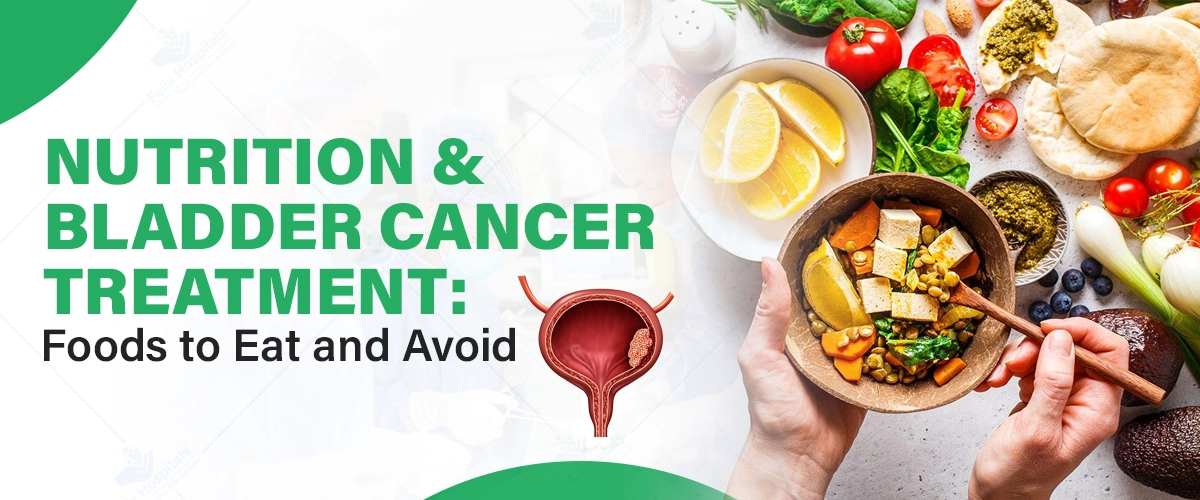Bladder cancer is a significant health condition requiring a comprehensive treatment approach, including surgery, chemotherapy, radiation, or a combination of these. Alongside these medical interventions, nutrition plays a vital role in supporting treatment and enhancing recovery. An optimal diet can help manage side effects, maintain energy levels, and improve overall well-being. For those seeking comprehensive care, the best hospital for bladder cancer treatment provides multidisciplinary support, including expert dietary guidance. Let’s explore the role of nutrition in bladder cancer treatment and identify the foods to eat and avoid for the best outcomes.
Start Your Journey to Recovery Now! Book Your Consultation today for bladder cancer treatment by Calling +91 9667064100.
Role of Nutrition in Bladder Cancer Treatment
Proper nutrition can significantly impact the journey of a bladder cancer patient. Here's how:
- Managing Side Effects: Chemotherapy, radiation, and surgery often cause side effects like nausea, fatigue, and appetite loss. A well-planned diet helps alleviate these issues.
- Boosting Immune Function: Foods rich in nutrients and antioxidants strengthen the immune system, helping the body fight infections and recover faster.
- Enhancing Energy Levels: A balanced diet provides sustained energy, enabling patients to cope with the physical demands of treatment.
- Improving Overall Well-being: Proper nutrition supports mental and physical health, promoting better outcomes during and after treatment.
Foods to Eat for Bladder Cancer Patients
- Antioxidant-Rich Foods
Fruits and vegetables such as berries, broccoli, spinach, carrots, and sweet potatoes are packed with antioxidants. These help neutralize free radicals, reducing inflammation and supporting immune health.
- Protein-Rich Foods
Lean meats, fish, eggs, legumes, nuts, and seeds provide essential amino acids for tissue repair and muscle strength. A balanced diet after bladder cancer surgery should emphasize protein to promote healing.
- Whole Grains
Brown rice, quinoa, oats, and whole-grain bread are excellent sources of fiber and energy. These foods improve digestive health and prevent constipation, a common side effect of cancer treatment.
- Healthy Fats
Avocados, olive oil, fatty fish (like salmon and mackerel), and nuts are rich in healthy fats that support heart health and reduce inflammation.
- Hydrating Foods
Water, herbal teas, cucumbers, watermelon, and other water-rich fruits and vegetables help maintain hydration, which is crucial during cancer treatment.
Foods to Avoid During Bladder Cancer Treatment
- Processed Foods
Foods high in sugar, sodium, and unhealthy fats can exacerbate inflammation and compromise overall health.
- Red and Processed Meats
These are linked to increased cancer risks and can cause digestive stress. Avoiding them is particularly crucial in a bladder cancer diet.
- Alcohol and Caffeine
These can irritate the bladder and kidneys, potentially worsening symptoms and treatment side effects.
- Spicy and Acidic Foods
Chili peppers, tomatoes, citrus fruits, and vinegar may irritate the bladder and digestive tract. Patients should consult their doctors regarding foods to avoid after bladder removal to prevent irritation.
- High-Salt Foods
Excessive salt intake can lead to water retention and strain on the kidneys, which may already be under stress from cancer treatment.
Importance of Maintaining a Balanced Diet During Treatment
- Portion Control: Eating smaller, frequent meals can help combat nausea and appetite loss.
- Meal Timing: Consuming meals at regular intervals stabilizes energy levels.
- Balancing Macronutrients: A diet balanced in proteins, carbs, and fats ensures the body gets all essential nutrients.
- Overcoming Challenges: Strategies like sipping on ginger tea for nausea, adding high-calorie smoothies, or incorporating easy-to-digest foods can address treatment-related appetite issues.
Meet with the Dietitians and Urologists at Felix Hospital for Bladder Cancer Treatment
Personalized dietary advice is critical for managing individual health conditions, especially during bladder cancer treatment. At Felix Hospital, expert guidance is provided by:
- Dietitians: Dr. Nida Zafar, Dr. Pooja Yadav, and Dr. Shivani Ahlawat specialize in creating tailored meal plans that address specific dietary needs and enhance treatment outcomes.
- Urologist: Dr. Bhanwar Lal Barkesiya, the best urologist in Noida, offers expertise in managing urological conditions, and ensuring comprehensive care for bladder cancer patients.
If you’re undergoing bladder cancer treatment, it’s crucial to get the right dietary advice. Contact Felix Hospital today to schedule a consultation by Clicking Here.
Conclusion
Nutrition plays a pivotal role in bladder cancer treatment, supporting recovery, managing side effects, and enhancing overall well-being. A bladder cancer diet is rich in antioxidants, proteins, whole grains, and healthy fats, while avoiding processed and irritating foods, can make a significant difference. Partnering with healthcare providers, including dietitians and urologists, ensures an optimal and personalized approach to care. For those navigating bladder cancer, working with the right team can help achieve the best possible outcomes.
FAQs about Bladder Cancer Treatment
Q- How can a balanced diet help during bladder cancer treatment?
Ans- A balanced diet helps manage side effects like nausea and fatigue, boosts immune function, and promotes healing after surgery or chemotherapy.
Q- What foods should I focus on during bladder cancer treatment?
Ans- Antioxidant-rich foods like berries, lean proteins, whole grains, healthy fats, and hydrating foods such as cucumbers and watermelon are recommended.
Q- Can I eat spicy foods after bladder cancer surgery?
Ans- It’s best to avoid spicy foods as they can irritate the bladder and digestive system, potentially worsening symptoms or discomfort.
Q- Are there any foods that can worsen bladder cancer symptoms?
Ans- Processed foods, red and processed meats, alcohol, caffeine, and high-salt foods should be avoided as they can exacerbate inflammation and strain the kidneys.
Q- Why is hydration important during bladder cancer treatment?
Ans- Staying hydrated helps maintain kidney function, reduce side effects like dry mouth, and support overall health during treatment.
Q- How can I manage nausea caused by chemotherapy with food?
Ans- Eating smaller, frequent meals and sipping ginger tea or consuming high-calorie smoothies can help alleviate nausea and maintain energy.
Q- Should I avoid alcohol completely during bladder cancer treatment?
Ans- Yes, alcohol can irritate the bladder and interfere with treatment, so it’s best to avoid it during your recovery phase.

